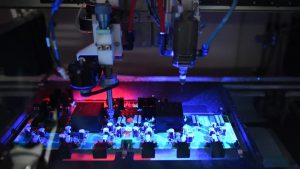In the club of correspondents, today news post is interested in the technological war between the United States and China on semiconductors. Washington wants to slow down the development of Beijing in the production of these electronic components, essential for advanced technologies.
 Production of semiconductors in Colomiers, Occitanie, in the Actia company. (REMY GABALDA / MAXPPP)
Production of semiconductors in Colomiers, Occitanie, in the Actia company. (REMY GABALDA / MAXPPP)
Without semiconductors, there is simply no digital: no 5G, no computers. The race for semiconductors is raging between the United States and China. Latest episode: Washington announced in early October drastic restrictions on its exports of electronic chips to the Middle Kingdom. This has consequences in Beijing, but also in Taiwan.
In the United States, the will to hinder the development of China
The United States has just tightened its export control rules. The aim is to further prevent China from manufacturing and purchasing its components. The U.S. Department of Commerce’s Bureau of Industry and Security makes it clear in its statement that these updates will limit China’s ability to both purchase and manufacture certain high-end chips used in military applications. . The Assistant Secretary of Commerce, quoted in the text, adds: “Our actions will protect the national security and foreign policy interests of the United States, while sending a clear message that American technological leadership is a matter of values and of innovation.”
This measure comes a few days after another decision, this time by the Pentagon, which blacklisted thirteen Chinese companies for their alleged links with the Beijing army. The US Department of Defense is targeting, without naming it, the Chinese company DJI, the world leader in drones.
Taiwan lines up behind Washington
This is not the first time that Washington has accused Beijing of industrial espionage and threats to national security. The standoff has hardened with the shortage of semiconductors linked to the covid-19 pandemic. Joe Biden had released 52 billion dollars this summer by Congress to relaunch their production here in the United States. For the White House, there is no doubt that these components are used by Beijing to produce advanced military systems and in particular, says the White House, weapons of mass destruction.
And in this economic war, Washington has just received the support of Taiwan, the Chinese island which crystallizes the tensions between the two powers. This position is not insignificant: Taiwan is one of the main suppliers of chips to China. Taiwan’s economy minister was here in Washington last week. She gave a press conference at a major hotel and promised that Taiwanese companies would abide by the latest US export controls. She said 42% of Taiwan’s exports and 60% of its chip exports were destined specifically for China.
In China, restrictions that hurt the tech industry very badly
It is a real stab for the Chinese semiconductor industry knowing that more than 90% of the chips used here, in China, are imported or manufactured locally by foreign suppliers, especially Taiwanese or South Koreans. From now on, it is forbidden for American companies, but also for those who work with the United States, to trade with 31 Chinese companies, including Yangtze Technologies, which works in particular with Apple.
And beyond the companies, the restrictions also apply to all American citizens who support the development or production of chips in factories in China with the threat of losing American citizenship which is causing resignations in a mess here and this Chinese Foreign Ministry spokesperson Mao Ning reacts: “The United States is maliciously blocking and oppressing Chinese companies by abusing export control measures. This behavior is against the principle of fair competition and violates international rules. This not only infringes the rights of Chinese companies, but will also affect American companies.”
China threatens the United States with retaliatory measures. But which ones? It’s still not very clear. We can fear for example that Beijing will attack Apple or Tesla, but this has not yet been said, knowing that for the United States, in any case, it is a battle that must absolutely be won.
China was prepared for such an American offensive, and tensions with Washington are not new. The Middle Kingdom had anticipated these American sanctions by investing in this sector as part of its “China 2025” program. But developing a self-sustaining domestic industry will still take time and that, China, doesn’t have much of that. The country absorbs 60% of the semiconductors produced in the world, and remains in particular behind with regard to the latest generation semiconductors.
China has therefore put its hands in the wallet to stimulate research with an investment program of some 150 billion dollars over 10 years and a frantic race to master this strategic industry, particularly for military systems and supercomputers.



























































